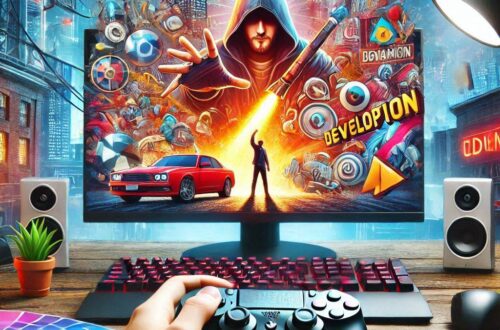Introduction
The world of game development is vast and ever-changing, offering a wide range of opportunities for creatives and entrepreneurs alike. Whether you’re an experienced programmer or a budding game designer, getting started in the industry can be both exciting and challenging.
Choosing Your Specialization

The first step in starting your career in game development is to decide on your area of specialization. There are many different roles within the industry, each with its own set of skills and responsibilities. Some common roles include:
- Programmer: This involves writing code and designing the technical aspects of games, such as graphics and animation.
- Game Designer: This role involves creating game concepts, mechanics, and storylines.
- Artist: This can involve a wide range of tasks, from creating characters and environments to animating and texturing them.
- Producer: This involves managing the development process, budget, and resources for a project.
Ultimately, your specialization will depend on your interests and skill set. It’s important to consider which area you feel most passionate about and which skills you already have or would like to develop. Additionally, it’s worth considering the demand for different roles in the industry, as some positions may be more in-demand than others.
Finding Resources and Tools
Once you’ve decided on your specialization, the next step is to find the resources and tools you’ll need to get started. This can include:
- Software: Depending on your role, you may need a variety of software programs, such as game engines like Unity or Unreal Engine, 3D modeling software like Blender or Maya, and coding tools like Visual Studio or Sublime Text.
- Online courses: There are many online courses available that can help you learn new skills and get started in the industry. Some popular options include Udemy, Coursera, and Codecademy.
- Books: There are also a wealth of books available on game development, covering everything from programming to art design. Some popular options include “Game Development with Unity” by Filipe de Souza and “The Art of Game Design” by Jesse Schell.
- Communities: Joining online communities for game developers can be a great way to connect with others in the industry, learn about new tools and techniques, and get feedback on your work. Some popular communities include Reddit’s r/gamedev, Stack Overflow, and Unity Connect.
Building Your Portfolio
As you work to develop your skills and gain experience, it’s important to build a portfolio of your work. This can be a great way to showcase your abilities to potential employers or clients, and can also help you get feedback on your work and improve your skills. Some tips for building a strong portfolio include:
- Start small: It’s okay to start with small projects, such as simple games or demos. As you gain more experience, you can work on larger, more complex projects.
- Be selective: When choosing projects to include in your portfolio, it’s important to choose work that showcases your best skills and reflects the role you’re applying for.
- Get feedback: Sharing your work with others and getting feedback can be a great way to improve your skills and get new ideas. Consider joining online communities or working with mentors to get feedback on your work.
Finding Your First Job
Once you’ve developed your skills, built your portfolio, and connected with others in the industry, it’s time to start looking for your first job. This can be a challenging process, but there are several strategies you can use to increase your chances of success:
- Networking: Building relationships with people in the industry can be a great way to get introduced to potential employers and learn about open positions.





